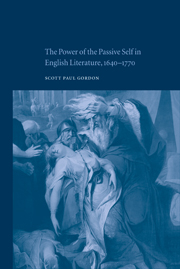Book contents
- Frontmatter
- Contents
- Acknowledgments
- Introduction. “Spring and Motive of our Actions”: disinterest and self-interest
- 1 “Acted by Another”: agency and action in early modern England
- 2 “The belief of the people”: Thomas Hobbes and the battle over the heroic
- 3 “For want of some heedfull Eye”: Mr. Spectator and the power of spectacle
- 4 “For its own sake”: virtue and agency in early eighteenth-century England
- 5 “Not perform'd at all”: managing Garrick's body in eighteenth-century England
- 6 “I wrote my Heart”: Richardson's Clarissa and the tactics of sentiment
- Epilogue: “A sign of so noble a passion”: the politics of disinterested selves
- Notes
- Bibliography
- Index
Introduction. “Spring and Motive of our Actions”: disinterest and self-interest
Published online by Cambridge University Press: 22 September 2009
- Frontmatter
- Contents
- Acknowledgments
- Introduction. “Spring and Motive of our Actions”: disinterest and self-interest
- 1 “Acted by Another”: agency and action in early modern England
- 2 “The belief of the people”: Thomas Hobbes and the battle over the heroic
- 3 “For want of some heedfull Eye”: Mr. Spectator and the power of spectacle
- 4 “For its own sake”: virtue and agency in early eighteenth-century England
- 5 “Not perform'd at all”: managing Garrick's body in eighteenth-century England
- 6 “I wrote my Heart”: Richardson's Clarissa and the tactics of sentiment
- Epilogue: “A sign of so noble a passion”: the politics of disinterested selves
- Notes
- Bibliography
- Index
Summary
DREAMS OF DISINTEREST
This is a book about the difficulty of belief, a story about late seventeenth-and early eighteenth-century writing that illuminates late twentieth-century writing as well. First and foremost, it traces the struggle of seventeenth- and eighteenth-century writers to reestablish the reality of disinterestedness – of behavior done for others, rather than for self – and to combat those who had argued that all public behavior is self-interested. The powerful critiques of Thomas Hobbes and Bernard Mandeville, reinforced by and reinforcing economic and political changes in Restoration and eighteenth-century England, aim to leave in their wake no space for even the possibility of behavior done for another; they position sincerity, disinterestedness, and virtue not as rare but as non-existent, as empty terms that correspond to no actual behaviors. As George Blewitt complained in 1725, “It is not only that most things are not Virtue, which the World take for such, but the Thing itself, we are told, is ridiculous in Theory, and mischievous in Practice.” Perhaps more than their logical “proofs,” these writers' rhetorical skill – their ability to construe everything through what Paul Ricoeur and Hans-Georg Gadamer call a “hermeneutics of suspicion” – seems to dismantle any criteria that might insulate behaviors from the accusation that they hide self-interest. Faced with this challenge, Restoration and eighteenth-century writers devise complicated strategies to re-convince themselves that disinterestedness is indeed possible.
But this story is not only about a distant time, for the difficulty of believing in disinterestedness persists.
- Type
- Chapter
- Information
- Publisher: Cambridge University PressPrint publication year: 2002



